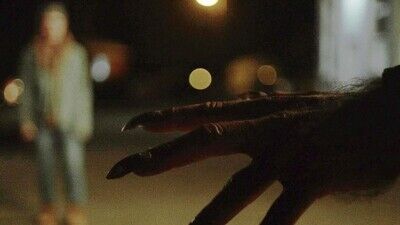Charley’s meandering trajectory is sometimes frustrating, though not because of his aimlessness. If anything, “Blackout” doesn’t ramble far enough into the lo-fi psychedelia and macabre lyricism that Fessenden excels at. Because Charley does have productive conversations, sometimes even with people whose company he enjoys, like Miguel (Rigo Garay), a family man who’s also falsely accused (by Jack) of Charley’s crimes, or Earl (Motell Gyn Foster), a chatty loner who makes silver bullets for Charley (and at his request). Fessenden’s pointed dialogue doesn’t always sound right coming out of his actors’ mouths, but it provides a welcome pretext for the movie’s best, largely conversation-driven scenes.
If anything, “Blackout”’s weakest when it’s most conventional, dutifully trailing after Charley as the body count increases and the cops get even closer. You can see his obvious affection for bit players like platitude-slinging Pastor Francis or even tough-talking barfly Bob (Kevin Corrigan), the latter of whom wants to fight underpaid Mexican migrant workers, and also paraphrases Winston Churchill when he’s three sheets to the wind. These guys also represent Talbot Falls, an American everytown named after Lon Chaney Jr.’s beloved Universal monster.
If there’s anything essential missing from “Blackout,” it’s more umwelt. The movie’s atmospheric opening scene provides a perfect example. A young couple, played by real-life partners Clay von Carlowitz and Asta Paredes, strip and try to get down in an open field. She laughs at him, and repeatedly asks if this is what he daydreams about. By the time that they’re attacked, we know enough about these characters to wish that we could know them better. That’s obviously impossible given their limiting involvement in Charley’s story.
You can still see why Fessenden likes these and other supporting characters, even if his reasons don’t always translate smoothly into a creature feature. His monster looks and sounds good, but it’s not really special like Fessenden’s movies often are. If anything, “Blackout” is cursed by its director’s well-earned reputation for going farther afield and with more poetic whimsy than most. Fessenden’s latest has a lot to recommend it, but not enough to fully satisfy.

